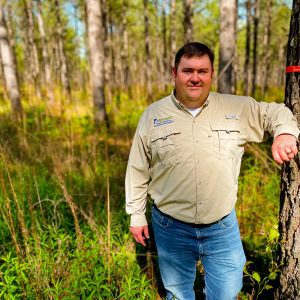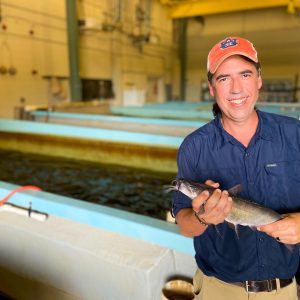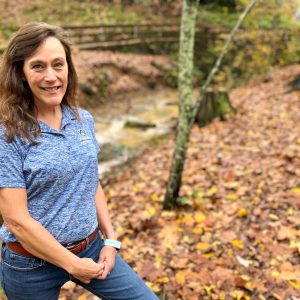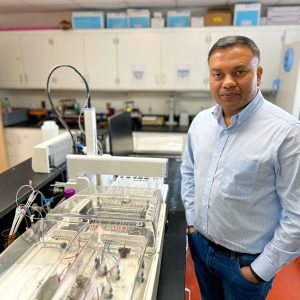About Us

AUBURN UNIVERSITY, Ala. – Predicting the future is never an easy task, and making decisions for the days and years ahead can be simply paralyzing for many people because of uncertainty. This holds true for the sustainability and protection of the Earth’s resources. To equip farmers and landowners with information needed to plan for the future, the Alabama Cooperative Extension System delivers research-based information to help preserve and protect natural resources for future generations.
Down to Earth: Agriculture Sustains Alabama
The Down to Earth statewide educational campaign launched in March 2022 with the intent to highlight the ways by which agriculture sustains Alabama. Alabama Extension joined many other partners in a proactive, educational campaign to highlight existing and promising sustainability practices that Alabama producers use on a regular basis. Tackling issues in sustainable practices requires unbiased, science-based information that Alabama Extension provides every day.
“This is what we have done in Extension since the Smith-Lever Act of 1914,” said Becky Barlow, Alabama Extension assistant director for agriculture, forestry and natural resource (AFNR) programming. “It’s our job to promote the best science for the citizens of Alabama and improve livelihoods and the environment of the state.”
Carbon Emissions
Carbon is likely near the top of the list when it comes to sustainability concerns. Alabama Extension professionals began with the basics, educating stakeholders about carbon in its purest form–the organic matter in our soils.
Extension experts shared research on other topics, including carbon sequestration in forests, carbon credits for landowners and poultry and beef cattle production’s carbon footprint.
Plant and Animal Efficiency
Producing a viable crop with minimal inputs and minimal soil disturbances is an important and necessary aspect of crop production. Alabama Extension researchers are continuing their research on the top plant and animal commodities of Alabama. Extension specialists dedicate their lives to ensuring that production is sustainable—for both the producer and the environment.
Research in cotton, a prominent crop in Alabama, continues to revolutionize the cotton industry. The golden era of cotton seed began nearly 25 years ago. This era set the course for producers to introduce seed with pest and weed control. Combined with ongoing cotton research at the Old Rotation at Auburn University –the oldest continuous cotton experiment in the world– the resources and information are plentiful for this crop.
Debunking myths about genetically modified organisms (GMOs), highlighting Alabama’s commitment to sustainable aquaculture and exploring the history of Extension programming are also ways Alabama Extension is working toward plant and animal efficiency.
Data and Technology
When discussing today’s popular culture of technology, drones and remote systems are some of the top hits. Extension is investing heavily in research using these new technologies to promote sustainability and efficiency.
“When thinking about data and technology and how they are used in forestry and agricultural systems, drones and precision agriculture come to mind,” Barlow said. “For example, drones can be used to monitor pests and diseases and precision ag also helps prevent the overuse of herbicides, fertilizers and water.”
- Alabama Extension Forestry Specialist Adam Maggard speaks to forest carbon sequestration.
- Alabama Extension Associate Extension Professor Luke Roy talks about sustainable aquaculture.
- Extension Economist Wendiam Sawadgo explains economic data’s role in market studies.
- Alabama Extension Water Resources Specialist Eve Brantley discusses water resources.
- Alabama Extension Crop, Soil and Environmental Sciences Specialist Rishi Prasad explains the art of soil nutrient management.
Conserving Natural Resources
Natural resources conservation is a topic that arguably applies to every Alabama resident. Approximately 94% of Alabama’s forests are owned by nonindustrial, private landowners. This means the future of the state’s environmental health lies in the hands of its residents. The direct correlation of environmental impacts and human input will rely on education of proven sustainable practices.
“Alabama has amazing water resources,” Barlow said. “This is something that our state is nationally known for. We have so many in fact that in some regions of the state, you’re never more than a mile or so away from a body of water –a lake, stream or a creek.”
Smart Land Use
Mastering the art of soil nutrient management is critical to the country’s food production system. More than ever, people want to know that their foods and products are sustainable. This means that farmers continue to adhere to recommendations from experts at land-grant universities, including Auburn University and Alabama A&M University.
Science-based information and best management practices are reflected in Extension’s mission to educate and improve the lives of Alabama residents. From the history of civilization’s agriculture practices to ways everyone can invest in their own soils, Alabama Extension professionals are dedicated to bettering the lives of Alabamians.
Sustaining for the Future
Although the Down to Earth campaign is coming an end, Alabama Extension continues to focus on sustainability. Recommendations from agents and specialists are upheld by Alabama Extension’s core values: service excellence, teamwork, inclusivity, accountability and integrity.
“Through this campaign we have illustrated the science behind current agricultural practices,” Barlow said. “We also have shown the reasons why they are so important to improve the environment in Alabama.”
Education plays a key role in spreading reliable information so that everyone has access to usable science. Alabama Extension will continue to be a hub for obtaining this information for years to come.
“Whether you’re a farmer, landowner, teacher or student, we are all in this together,” Barlow said. “Everybody can do something to make a difference and Extension is here to help.”
More Information
Graphics, articles, videos and other resources from Alabama Extension’s contributions to the Down to Earth campaign are available online at www.aces.edu/go/DowntoEarth.






